- Home
- Amanda Hocking
The Lost City Page 5
The Lost City Read online
Page 5
We’d finally reached the stone fortress at the center of Merellä. It was a massive four-stone Romanesque building, with several towers stretching even higher. Most of the exterior appeared simple and clean, with very few Gothic flourishes to give it an air of aristocracy. The closer we got to it, the more imposing and formidable it felt.
In front of the main entrance into the Mimirin, everyone had to line up to pass through security. At the gates were several guards, running two different kinds of wands over everyone who passed—one that was electronic and scanned for basic weapons, and the other psionic, made with crystals and ancient twisted roots, to check for supernatural threats. The whole process didn’t appear much different than when I’d gone through security at the airport, the one time I’d flown.
Unlike airport security, the guards were armed, and they had their weapons on full display. Most of them appeared to either have a dagger or a sword sheathed on one hip, but they all had PSGs—psionic stun guns. They were stocky, nonlethal weapons, usually made from a carved hardwood with four sharp prongs at one end.
“What is a docent?” I asked Dagny, once we’d fallen in beside each other in one of the lines.
“It’s like an adjunct professor, but instead of taking a salary, a docent works for free,” she explained. “Elof teaches a few classes here in exchange for room, board, and access to their extensive research facilities.”
“Are the facilities really that great here that he’d forgo a paycheck?”
“I guess it depends on what you value more—money or the existence of our kind,” she said with a cynical smile. “The goal of Elof’s research is to discover the sources of our psychokinetic abilities and if there’s a relationship with tribal infertility. If we can do that, we might be able to strengthen our blood and our birthright. His work might be our only chance at stopping our own extinction. Personally, I’d take saving our kind over money any day, but maybe that’s just me.”
“That sounds a little fatalistic to me,” I argued. “Things are rough, but that doesn’t mean we’re going extinct.”
“The fact that you’re even here is proof that I’m not the only one who’s worried.”
“What do you mean?”
“You’re here for the Inhemsk Project. Do you really think the Mimirin would let in TOMBs like you?” Dagny asked. I must’ve looked confused, because she clarified, “TOMB is an acronym for ‘trolls of mixed blood.’ That’s what everyone calls the Inhemsk Project members.”
“TOMBs?” I laughed dryly. “Everything around here is so Gothic and gloomy. Maybe I can get together with the rest of the TOMBs, and we can start a Joy Division cover band.”
Once we finally got through security, we entered the grand main hall, where the barrel-vaulted ceiling stretched out a hundred feet above us. I wanted to take a moment to appreciate the enormity of it all and the history carved into the architecture, but the crowd was pushing me along.
Just around the corner of the main hall was a large room full of tiny lockers, and Dagny quickly ushered me over to them.
“No shoes allowed beyond here,” she explained, not that I minded. Like most trolls, I hated wearing shoes, and I was always looking for a way around them.
The lockers had a slot for change, and it cost only two quarters for the entire day. Once a locker was shut, a key was released, and I slid it onto the long chain I wore around my neck, along with the key to the apartment and a stone talisman carved into a small polar bear.
Dagny led me down a long corridor off the locker room, and then stopped abruptly when the hallway forked underneath an arch.
“Well, this is where we part ways.” Dagny motioned down the hall. “The Inhemsk office is the second door on the right.”
“Thanks for getting me this far,” I said, but she had already started walking in the opposite direction down the hall.
10
Inhemsk
Like many of the other doors I’d passed in the Mimirin, the office door had a frosted stained-glass image inlaid in the wood. This one featured a yellow flower dipped in red blood, and while I wasn’t sure what it was in reference to, it seemed fitting for the Inhemsk Project.
I knocked meekly on the door, and a gravelly female voice immediately barked, “Come in!”
I stepped into an office overflowing with paper. Bookcases and mismatched file cabinets were lined up throughout the office, creating a labyrinth of cubicles where half a dozen men and women were typing furiously on old laptops. Files, binders, books, and loose-leaf paper were stacked up all over the desks and any available surface, so it was hard to get a real sense of the size of the office.
The only obviously visible troll was a tall, slender woman in her forties, standing to the side of the desk buried in the center of the room. She held a copper thermos in her hands, the many rings on her long fingers clanking gently against the metal. Her dark brown curls hung stiffly above her shoulders, and she wore a fitted navy blazer with tapered pants, giving her an air of cool professionalism.
From under heavy hooded lashes, her dark eyes stared skeptically at me. “Can I help you?” she asked, in the same gruff voice that had invited me in.
“I’m Ulla Tulin. I’m here for the internship.”
“Right.” Her thin lips pressed into a tight smile. “The Trylle favor.”
I bristled slightly but kept my smile polite. “I wouldn’t say that a recommendation letter is a favor—”
She waved her hand. “It doesn’t matter. You’re here, and we take all the help we can get. I’m Sylvi Hagen, the director of the Inhemsk Project. Unfortunately, I have a meeting, so I won’t be able to show you around, but I’ll leave you in capable hands.”
Sylvi’s gaze turned to a young man, mostly hidden behind the stacks of folders and files on the desk nearest to her. In fact, I could only really see his short black curls and sharp eyebrows.
“You have some time now, don’t you?” Sylvi asked, absently tapping her rings against her thermos.
“Yeah, of course,” he replied without hesitation.
“Perfect.” She turned back to me with a bland, tired smile. “So, Ella—”
“Ulla,” I corrected her.
“Right. Ulla Tulin, this is one of our researchers, Panuk Soriano.”
I stepped closer to Sylvi so I could finally get a real look at him, but he was already getting to his feet. He couldn’t have been much older than me, though I suspected that his full cheeks and wide dark eyes gave him a deceptively youthful appearance. He leaned over the desk, extending his arm out toward me, and I realized—with a nervous flurry warming my belly—that he was very handsome.
“Nice to meet you,” he said as we shook hands.
“Likewise,” I said, swallowing back my nerves enough to manage a smile.
“Great,” Sylvi announced abruptly. “I’ll leave you two to it, then.” Then she walked away, leaving Panuk to sort everything out with me.
“So, Sylvi gave me your file this morning,” he explained as he shuffled through the folders on his desk. “But, of course, now I can’t find it.” He grimaced and shook his head. “I’m sorry about this. Sylvi likes to say that the office is in a constant state of organized chaos, but it’s really just chaos.”
He let out a self-deprecating laugh, then straightened up and rubbed the back of his neck. “I can’t find your file now, but it doesn’t matter because I read it earlier, and you’re here now, so . . .”
When he looked back at me, an easy crooked smile spread out across his face. “I guess that makes me your official welcome wagon. Welcome to the glamorous world of dusty books and paper cuts. I’m sure you’ll come to adore squinting at illegible ancient handwriting well into the wee hours of the morning.”
“Wow, I hadn’t realized it was so prestigious. Now I feel underdressed,” I joked and motioned to my plaid challis shirt and skinny jeans, an outfit that wasn’t all that dissimilar from his own flannel and jeans combo.
He looked me over, then
laughed again, but this time heartier and warmer. “I think you’ll fit in just fine around here.”
I tucked my hair behind my ear. “I hope so.”
“I should probably start by showing you around.” He walked out from behind the desk, coming over to where I stood awkwardly in the middle of the office, and then he gestured vaguely around. “This is the main office, where all the salaried staff have their desks and do their work. But the volunteers and interns spend hardly any time here, so I’ll spare you all the gory details of our nightmare filing system.
“You understand how this whole arrangement works, right?” he asked. “Each day you give us seven hours helping to collate our records and enter data, you get two hours of access to our records to look up your family and ancestry.”
I nodded. “I gotta put in my time if I want your help.”
“That is basically the motto at the Mimirin.” He leaned in closer to me, lowering his voice to a conspiratorial tone. “Don’t tell anyone I said that. The motto is actually, ‘Ex nihilo nihil fit,’ and if the powers that be heard me saying otherwise, they would not be happy.”
“They take their mottoes here that seriously, huh?” I asked.
Panuk glanced around before continuing, still in a hushed voice, “Honestly, they take everything too seriously.” He straightened up. “But don’t let me scare you off. Everyone takes it seriously because what we do matters, and there’s nowhere else in the world you can get the education you get here.”
“Well, that’s why I’m here,” I told him.
“Perfect.” He took a step backward, heading toward the door. “You’ll be working with Calder Nogrenn in the archives, and if you love history, it’s a good gig.”
He went out into the hallway, holding the door open for me as I followed him. “The only bad thing about the archives is that they are way, way down in the basement.”
We walked along, and Panuk listed the various amenities as we passed them—restrooms, nearest cafeteria, the rec room with the “good foosball table.” In fact, he talked the entire way, helpfully explaining as much as he possibly could, so that when he finally stopped, it felt eerily silent. It didn’t help that by then we had started the long descent down the winding stone staircase into the basement.
“So, Panuk?” I began, attempting to restart the conversation so we wouldn’t be trapped in an awkward silence. “That sounds Inuit.”
“Everyone calls me Pan, actually,” he corrected me gently, then sighed. “Sylvi’s not so great with names.”
“Yeah, I figured that,” I admitted with a laugh.
He waited a beat before finally saying, “My grandfather was Inuit.”
He said it softly, but not in the conspiratorial joking way he’d spoken before. This was quiet, restrained, like a reluctant confession. He didn’t look directly at me as he spoke, instead only peering at me from the corner of his eye.
“Ullaakuut,” I said.
He gazed at me with dark eyes, pausing on the step for a moment, until he finally replied with, “Ullaakuut.” A slow, crooked smile spread out on his face, and he fell in step beside me. “How do you know Inuit?”
Inuit refers to the indigenous humans of the Arctic regions in North America and the language they speak. In the past, the Inuit may have been called Eskimos, but now that term was generally considered a pejorative. Their people had lived here even longer than the trolls, before we came over with the Vikings, and at various times in our long history we had united with them against our shared enemy of aggressive colonialism.
As such, trolls held a slightly higher opinion of the Inuit than they did most other humans, but that didn’t really mean much, considering how little the troll tribes thought of humanity as a whole. But we had managed to fall into an uneasy alliance with the Inuit, working and living together in the Far North when we needed to, and we respected each other’s privacy and independence.
“I grew up in Iskyla, so I spent a lot of time interacting with the native humans.”
Pan shook his head as he chuckled to himself. “I have to say that is the most unexpected response I’ve ever gotten to someone finding out that I’m a quarter Inuit.”
“How does everyone else react?” I asked, even though I suspected I already knew the answer.
“Well, most trolls aren’t so kind when they find I’ve got human blood,” he answered, rather diplomatically.
“I’ve been here for about two years now, and it has been downgraded to a grudging skepticism from outright disgust, so I guess that’s an improvement.” Probably realizing what he’d said, he hurried to reassure me with a strained smile. “Don’t worry, though. It’ll be easier for you because you’re a TOMB. The real trouble is when you’re a half-TOMB. I’m a KanHu half-TOMB, to be more specific.”
“Kanin and human?”
“Yep. And if I recall correctly, you’re a Skomte?”
“Yeah.” I paused and shook my head. “I mean, I think so. I never even met my parents, so I honestly can’t say for sure.” When trolls saw blond hair, they thought Skojare, but my strength and facial asymmetry was almost certainly Omte. So, the Tulins had assumed I was Skomte.
“Tomorrow I’ll get you set up with a blood test, and then you’ll know for sure,” he said as we reached the basement. “But we’re finally here.” He hooked his thumb at two massive arched wooden doors. “Are you ready to see where you’re going to spend the rest of your time here?”
11
Archival
It was a room of shelves. Floor-to-ceiling—roughly ten feet, ladders needed to reach half the shelves—with archways cut into the bookcases, creating tunnels that ran through row after row of files, boxes, and papers. Most shelves ran parallel to each other, but a few of them crossed this way and that, creating random dead ends and giving it a rather claustrophobic and labyrinthian feel.
The doors opened to the largest of the tunnels, which led straight to the desk at the center. It was a circular desk, and the front side had been intricately carved with scenes from troll history. Vines and trees weaved together in a delicate lattice and connected the various events, bridging the gaps between the ships escaping Scandinavia, to the first settlements in the Arctic, to the battles between the tribes.
Scrolls were set in small piles around the desk, with a man sitting hunched over one in the middle of it all. His right hand was buried in his salt-and-pepper hair, while he used his left to hurriedly scribble onto a pad of paper. The long sleeves of his burgundy caftan hung over his hands, and smudges of black ink stained the golden embroidered designs that ran along the hem.
“And this is where your adventure begins,” Pan said to me with faux bravado as we approached.
The man looked up, his eyes crinkling as he smiled, and he set aside his pen. “Well, hello, Pan. What brings you down to the depths of the dungeon?”
“Ah, Calder, you know I can never get enough of your happy face.” Pan leaned against the desk, then nodded at me. “But right now I’m showing around the new recruit. This is Ulla Tulin, the intern who’ll be helping you. Ulla, this is Calder Nogrenn, our resident history expert, heritage buff, and regular aficionado on all things that go bump in the archives.”
“I look forward to helping out and learning from you,” I said.
“Then let this be my first lesson to you—beware of Pan’s silver tongue,” Calder said with a smirk.
Pan rolled his eyes and warned me, “Flattery gets you nowhere with this one. But he is genuinely one of the smartest guys around, and you’ll be in good hands with him.”
“Now, that part is true,” Calder agreed with a wink. “What languages are you fluent in?”
“Fluent?” I sucked in air through my teeth. “I’m only truly fluent in English, but I know quite a bit of Inuit, and I’ve studied all of the old Germanic languages.”
“Old Germanic is exactly what we deal with down here.” Calder shifted around the scrolls. “Do you think you know enough that you could help me organ
ize these?”
“I’ll do my best,” I said, hoping I sounded more confident than I felt.
Calder pushed one of the scrolls across the desk toward me, the old paper unrolling to reveal faded black letters scrawled across the parchment.
Pan knocked gently on the desk and straightened up. “I’ll let you guys get to work, then.” He started backing away, but his eyes lingered on me. “You know where I am if you need anything.”
I smiled at him. “I do. Thanks for showing me around.”
“What can you make of this one?” Calder asked, tapping the scroll and pulling my attention back to him.
I awkwardly attempted to sound it out. “Miliassnn Togo?”
Calder chuckled and shook his head. “I forget how hard to read these old black letters can be. I’ve gotten so used to the handwriting of Hilde Nilsdotter, I can read it better than my own.”
“Who is Hilde Nilsdotter?”
“You’ve never heard of her?” He cocked an eyebrow at me. “She is perhaps the most important historian in troll antiquity.” He leaned back in his chair and tapped his pen on his paper. “Where were you educated?”
“Mostly in Iskyla, which means practically no education.” I fidgeted with the pendant around my neck. “In Förening, the family I nannied for helped me out with homeschooling.”
That was the short version of the story. The longer one was that I’d tried to go to the school in Förening—Finn and Mia had actually insisted on it, if I wanted to stay with them—and I had been so far behind in most of my subjects that it had been impossible for me to follow along. That led to kids bullying me, and the whole situation was untenable.
At least I knew how to read and write, so Finn pulled me out of school. He hired me a tutor who came a few evenings a week, and the rest of the time I fell under the tutelage of Finn, Mia, the local librarians, and online teaching aids and classes. Together it all added up to a rather hodgepodge but somewhat extensive education, which was how I’d ended up semi-fluent in partially dead languages but didn’t know the name of a famous historian.

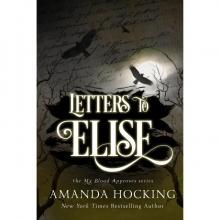 Letters to Elise: A Peter Townsend Novella
Letters to Elise: A Peter Townsend Novella Hollowmen
Hollowmen Swear
Swear Switched
Switched My Blood Approves
My Blood Approves Forgotten Lyrics
Forgotten Lyrics Frostfire
Frostfire Between the Blade and the Heart
Between the Blade and the Heart Wake
Wake Torn
Torn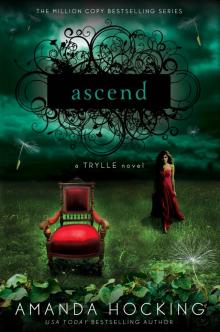 Ascend
Ascend Ice Kissed
Ice Kissed Hollowland
Hollowland Fate
Fate Elegy
Elegy Lullaby
Lullaby Wisdom
Wisdom Tidal
Tidal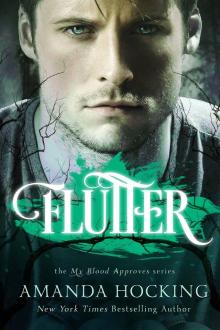 Flutter
Flutter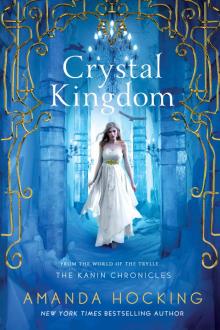 Crystal Kingdom
Crystal Kingdom From the Earth to the Shadows
From the Earth to the Shadows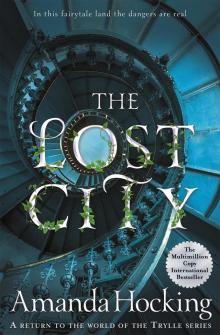 The Lost City
The Lost City The Morning Flower
The Morning Flower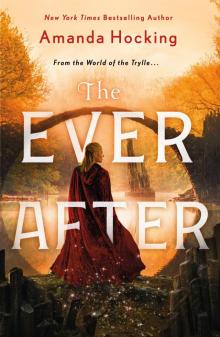 The Ever After
The Ever After Trylle
Trylle Watersong03 - Tidal
Watersong03 - Tidal Wisdom (My Blood Approves series)
Wisdom (My Blood Approves series) Virtue - a Fairy Tale
Virtue - a Fairy Tale Elegy (Watersong #4)
Elegy (Watersong #4)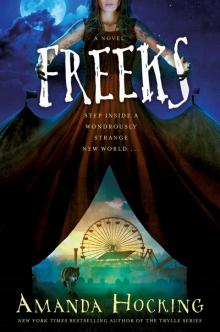 Freeks
Freeks Forgotten Lyrics: A Watersong Story (A Watersong Novel)
Forgotten Lyrics: A Watersong Story (A Watersong Novel) Swear (My Blood Approves #5)
Swear (My Blood Approves #5) Ice Kissed (The Kanin Chronicles)
Ice Kissed (The Kanin Chronicles) My Blood Approves mba-1
My Blood Approves mba-1 Forgotten Lyrics: A Watersong Story
Forgotten Lyrics: A Watersong Story Lullaby (A Watersong Novel)
Lullaby (A Watersong Novel) Wake (Watersong Novels)
Wake (Watersong Novels) Elegy w-4
Elegy w-4